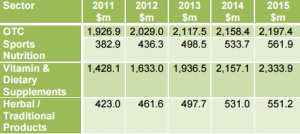‘Jobs and Growth’ through more reliance on health supplements and vitamins?

By Denis Bright
Drawing upon research from US media networks, the ABC’s Four Corners offered a timely review of the hazards of commercial health supplements and vitamins in the Complementary Medicines Sector (CMS).
The quest for extended youth and vitality through consumption of pills and powders has an unstoppable appeal which is associated with a search for youth and restored vitality.
Complementary Medicines Australia (CMA) is keen to accentuate this trend. CMA is the co-ordinating business hub of over 200 registered firms in the complementary health sector. Health supplements now choke the aisles of local pharmacies, supermarkets and the shelves of online outlets.
In many Australian lower and middle households, expenditure on CMS products dwarfs the modest 2 per cent levy imposed on taxable income.
At the highest end of the taxation scale, systematic tax evasion leaks income away from Medicare at a rate of $20 000/million to inappropriate family trusts and other income alienation schemes. This encourages the federal LNP towards cost-cutting within Medicare by imposing new limits on bulk-billing of medical and ancillary services as part of its so-called budget repair strategies.
CMA cheers on the phenomenal growth of its market share in Australian health for Over the Counter Products (OTC).

cmaaustralia.org.au
Ironically for committed providers of alternative heath supplements, the CMA’s budget submissions advocate the LNP’s ideals of fiscal discipline and less regulation of its own sector by the Therapeutic Goods Administration (TGA).
This growth in expenditure on CMS products challenges Australia’s traditionally modest expenditure on health within a well established social market sector. Australia’s overall official health expenditure is just over 10 per cent of GDP, compared with 17 per cent in the US which has a lower commitment to public health.
Australia’s supervision of the complementary medicine sector is under The Therapeutic Goods Act 1989 (Cth).
Providers of the complementary medicines and supplements pay a registration fee with the TGA and a nominal amount for testing of their products. Products which do not comply with health standards are routinely taken off the list of OTC items despite complaints from some CMS providers of over-regulation.
While this testing of OTC products is almost cost neutral to the Australian Government, there are opportunities for the TGA to market its own additional tick of approval which gives consumers access to added information of the efficacy of the products being marketed.
Opportunities also exist for the investment of seed capital from the Australian government or commercial investors to expand the role of the Therapeutics Goods Administration (TGA) to provide more comprehensive consultancy advice for Australians and perhaps developmental assistance to developing countries in the monitoring of their own OTC products.
Rather than watch the leakage of health expenditure towards the CMS sector, the Queensland Labor Government suggested an increase in the current Medicare levy at the recent Council of Australian Governments (COAG) forum as a more equitable alternative to a proposed return to state government income taxes.
Insiders within the federal LNP are ideologically committed to a more market-oriented health model for Australia and this has strong support from CMA.
In the words of the Assistant Minister for Innovation Wyatt Roy, the future is in better hands with business corporations at the helm:
Wyatt Roy, Q&A 28 March 2015: “I’m a Liberal, I’d like to see lower taxes, less regulation, less government intervention in your life so you can do what you do so well which is be an incredible world-changing entrepreneur, that’s where I think the debate should go … these sorts of tax changes we will have to do over four, five, six budgets but if we keep ourselves ahead of the global race, I am optimistic.”
Four Corners has alerted Australians against following the US market-model in public health by introducing a range of CMS products with limited or negative therapeutic value that have slipped through the regulatory limits of the Food and Drug Administration (FDA).
 Denis Bright (pictured) is a registered teacher and a member of the Media, Entertainment and Arts Alliance (MEAA). Denis has recent postgraduate qualifications in journalism, public policy and international relations. He is interested in developing pragmatic public policies for a social market that is quite compatible with contemporary globalization. Denis will be absent for three weeks in Southern Europe from the 19 May enjoying some of the dividends from his Q Super Fund. He will report back later in the campaign as trends become more firmly established by mid-June.
Denis Bright (pictured) is a registered teacher and a member of the Media, Entertainment and Arts Alliance (MEAA). Denis has recent postgraduate qualifications in journalism, public policy and international relations. He is interested in developing pragmatic public policies for a social market that is quite compatible with contemporary globalization. Denis will be absent for three weeks in Southern Europe from the 19 May enjoying some of the dividends from his Q Super Fund. He will report back later in the campaign as trends become more firmly established by mid-June.
Like what we do at The AIMN?
You’ll like it even more knowing that your donation will help us to keep up the good fight.
Chuck in a few bucks and see just how far it goes!
Your contribution to help with the running costs of this site will be gratefully accepted.
You can donate through PayPal or credit card via the button below, or donate via bank transfer: BSB: 062500; A/c no: 10495969










11 comments
Login here Register here-
New Directions Appreciated -
Maria -
Lalnama -
Steve Laing - makeourvoiceheard.com -
Antonio Gramsci Lives On -
gee -
New Directions Heeded -
Rubio@Coast -
Renewal Yes -
Not New Age -
Athena
Return to home pageThanks to Four Corners and Denis’ article for this article on Complementary Medicine
If a product or service claiming health benefits cannot provide unequivocal evidence- based proof of its claim, then it should attract no government funding or private health insurance rebate. As a nation, we would learn to judge the value of an idea, product or process if we rated science over spin every time.
Timely article Denis, the LNP are being very cunning in trying to fool voters into believing they have no intention of dismantling Medicare. Labour stand for social justice and a right of all Australians to an equitable health care system Keep up the great articles Denis !!
Less regulation. Great for exploiters and criminals. One of the key roles of government IS regulation. Nobody else does it. Suggesting we should have less is a very good reason that Wyatt Roy is not fit to be in government.
The politics of alternative medicine! What a poor substitute to the National Health Schemes in socially just societies. As the article tells us. the market-driven health model also costs more. Thanks Denis!
the government should not be funding “health supplements”. the governments role in health is primary health care, despite the LNP’s obvious efforts to fully privatise the system.
That’s a very good point, Gee. Read the Budget submissions from the CMA and this lobbying group calls on the Australian government to fund its own research through Innovation Grants. This co-exists with calls by the CMA for more restraint in government spending.
Yes lots of dietary supplement use at the Coast, Denis. Looks like political involvement offers a better solution to our problems.
Stay fit Rubio: You don’t need such dietary junk
Imagine a LNP government subsidizing this junk while cutting real health spending: straight from the US health model
There’s a term for complementary and alternative medicines that have been shown to work. They’re called medicines. We need far better regulation of complementary and alternative medicines, not less. Just Google “Pan Pharmaceuticals” to know why.